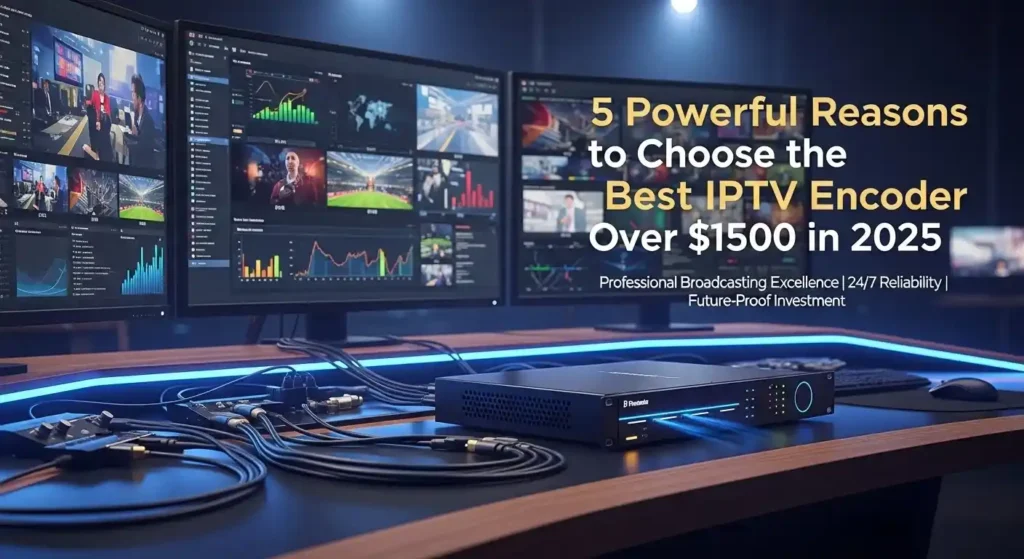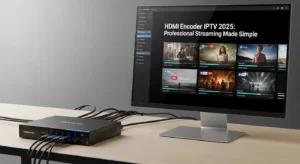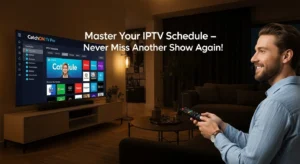Introduction
Is your IPTV workflow strong enough to handle 24/7 enterprise streaming without failure? With the global IPTV market projected to reach $117.1 billion by 2025, investing in a professional IPTV encoder over 1500 has become more than just an equipment upgrade—it’s a strategic business decision that separates amateur operations from professional broadcasting infrastructures.
The streaming landscape has evolved dramatically, with viewers now expecting flawless 4K content delivery, minimal latency, and rock-solid reliability. Budget encoders that once seemed adequate are now showing their limitations under the demanding requirements of modern IPTV operations. Whether you’re an IPTV reseller managing multiple channels, a broadcaster delivering live sports content, or a corporate streaming professional, choosing an IPTV encoder over 1500 represents a long-term investment in your streaming infrastructure’s stability and growth potential.
Industry data reveals that 73% of streaming failures can be traced back to inadequate encoding equipment, with the average cost of downtime reaching $5,600 per hour for professional operations. This reality makes the decision to invest in premium encoding hardware not just logical, but financially essential for serious IPTV professionals.
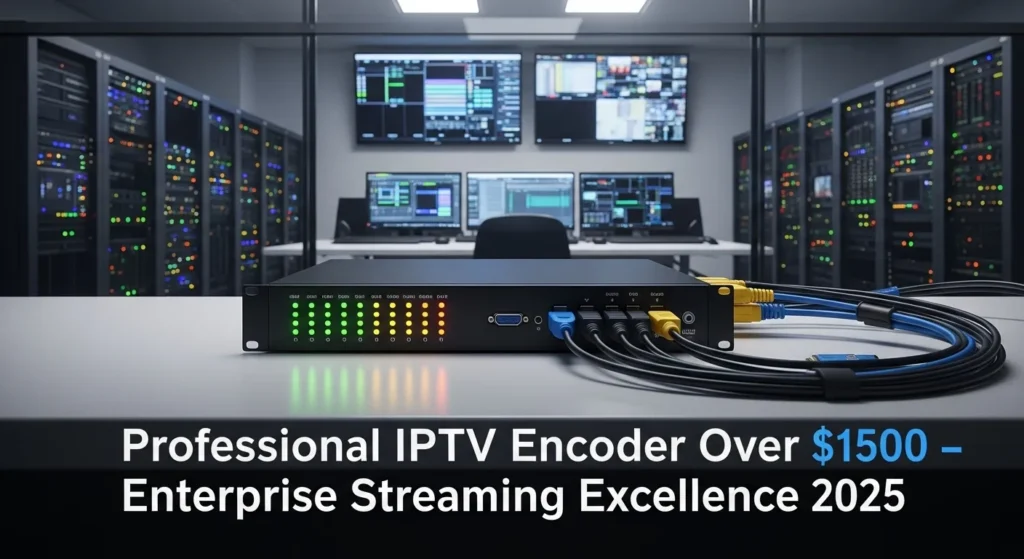
Table of Contents
Why Choose an IPTV Encoder Over 1500?
The fundamental difference between budget encoders and professional IPTV encoders over 1500 lies in their architectural design and intended use cases. While consumer-grade encoders under $1,500 are built for occasional use with basic streaming requirements, professional encoders above this price point are engineered for continuous operation, superior performance, and enterprise-level reliability.
Budget encoders typically offer limited codec support, basic HDMI input, and consumer-grade components that may struggle under extended use. They often lack advanced thermal management, redundancy features, and the robust build quality necessary for 24/7 broadcasting operations. Most importantly, they frequently suffer from inconsistent performance when handling multiple simultaneous streams or high-bitrate content.
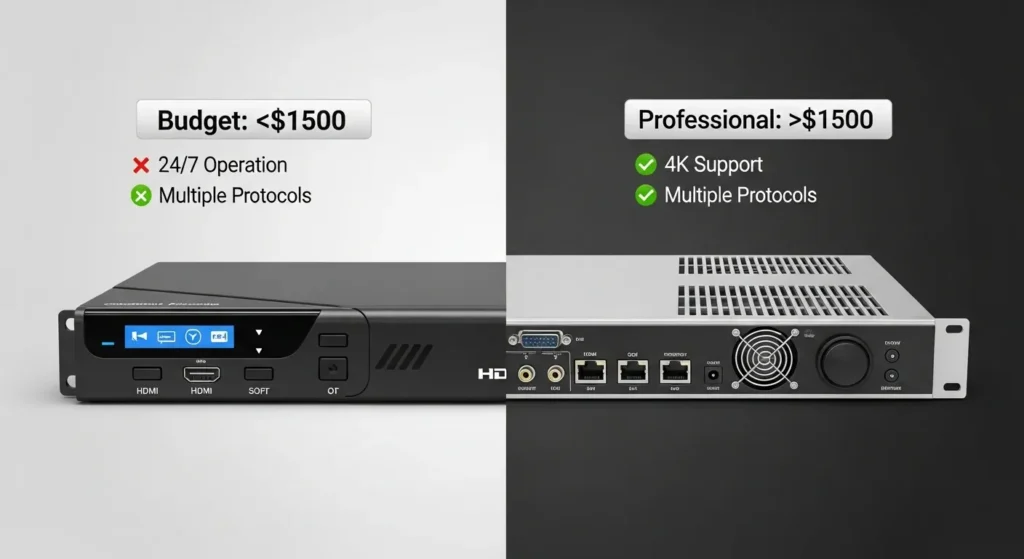
In contrast, professional IPTV encoders over 1500 feature industrial-grade components, advanced cooling systems, multiple input interfaces, and comprehensive protocol support. They’re designed to maintain consistent performance across extended operational periods, handle multiple concurrent streams without degradation, and provide the reliability that professional IPTV operations demand. IPTV encoder over 1500.
The return on investment becomes clear when considering operational costs. A $2,500 professional encoder that operates flawlessly for five years costs significantly less than replacing multiple budget units, dealing with downtime, or losing subscribers due to quality issues. Professional encoders also maintain their resale value better, making them a smarter long-term investment for growing IPTV operations.
Core Components of High-End IPTV Encoders
Professional IPTV encoders over 1500 incorporate several critical components that distinguish them from budget alternatives. Understanding these components helps IPTV professionals make informed purchasing decisions and optimize their streaming workflows. IPTV encoder over 1500.
Video Input Interfaces form the foundation of any professional encoding system. Premium encoders feature multiple input options including HDMI 2.0/2.1 for 4K content, 3G/6G/12G-SDI for broadcast-quality signals, and emerging standards like NDI for IP-based video workflows. Many high-end models support simultaneous inputs, enabling complex multi-source broadcasting scenarios.
Advanced Codec Support represents another crucial differentiator. While budget encoders often support only basic H.264 encoding, professional units offer H.265/HEVC for superior compression efficiency, with some models already incorporating AV1 readiness for future-proofing. This codec flexibility enables significant bandwidth savings—H.265 typically reduces file sizes by 25-50% compared to H.264 while maintaining identical quality. IPTV encoder over 1500.
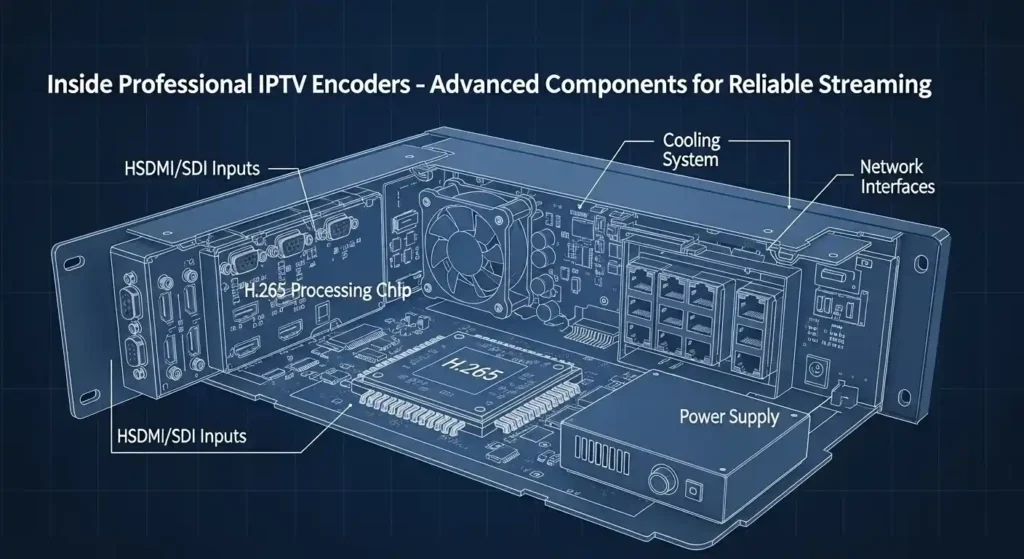
Streaming Protocol Versatility ensures compatibility with diverse IPTV infrastructures. Professional encoders support RTMP for traditional streaming platforms, UDP for low-latency broadcasting, HLS for adaptive bitrate streaming, and SRT for reliable internet transmission. This comprehensive protocol support eliminates compatibility concerns when integrating with existing systems or expanding to new platforms.
Hardware-Based Processing provides the computational power necessary for real-time encoding without CPU bottlenecks. Dedicated encoding chips handle compression tasks efficiently, maintaining consistent performance even during peak operational periods. This hardware approach delivers superior quality and reliability compared to software-based encoding solutions.
Thermal Management Systems ensure consistent performance during extended operation. Professional encoders incorporate advanced cooling solutions including multiple fans, heat sinks, and temperature monitoring systems. This attention to thermal management prevents the performance degradation and hardware failures that plague consumer-grade equipment during continuous use. IPTV encoder over 1500.
Setup & Efficiency
Professional IPTV encoders over 1500 are designed for streamlined deployment, typically requiring 15-30 minutes for initial configuration compared to hours of troubleshooting often required with budget alternatives. This efficiency stems from their intuitive web-based interfaces, comprehensive documentation, and robust default configurations that work reliably out of the box.
Integration with existing workflows proves seamless thanks to standardized protocols and extensive compatibility testing. Professional encoders support industry-standard streaming protocols, making them compatible with major CDNs, IPTV middleware platforms, and broadcasting infrastructure. This compatibility eliminates the integration challenges that often plague budget equipment deployments. IPTV encoder over 1500.
Step-by-Step Setup Guide
Step 1: Connect HDMI/SDI Input Begin by connecting your video source using the appropriate cable type. For 4K content, ensure you’re using HDMI 2.0 or higher specification cables. SDI connections require proper impedance matching and high-quality cables to maintain signal integrity. Professional encoders typically auto-detect input formats and adjust settings accordingly.
Step 2: Configure Encoder Network Settings Access the encoder’s web interface and configure network parameters including IP address, subnet mask, and gateway settings. Professional encoders support both DHCP and static IP configurations, with many offering dual network interfaces for redundancy. Configure NTP settings to ensure accurate timestamps for streaming protocols. IPTV encoder over 1500.
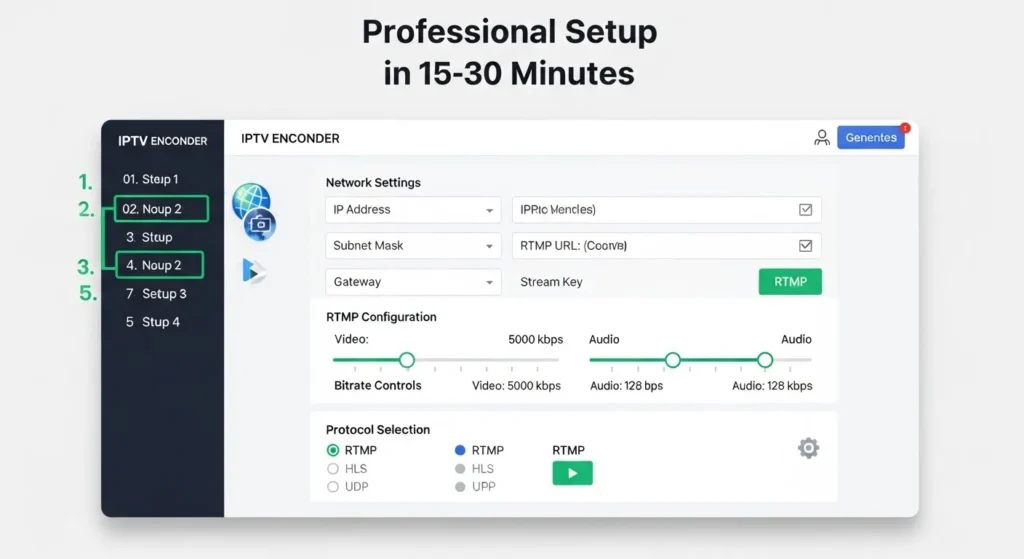
Step 3: Choose Output Protocol (RTMP, HLS, UDP) Select the appropriate streaming protocol based on your distribution requirements. RTMP works well for single-destination streaming, HLS enables adaptive bitrate delivery, and UDP provides the lowest latency for real-time applications. Many professional encoders support simultaneous multi-protocol output, enabling flexible distribution strategies. IPTV encoder over 1500.
Step 4: Optimize Bitrate/Resolution for Bandwidth Configure encoding parameters to match your available bandwidth and quality requirements. Professional encoders offer precise bitrate control, enabling optimal balance between quality and bandwidth consumption. Set keyframe intervals, GOP structure, and bitrate adaptation parameters according to your specific use case. IPTV encoder over 1500.
Step 5: Go Live with Professional Reliability Activate your stream and monitor performance metrics through the encoder’s dashboard. Professional units provide comprehensive monitoring including bitrate graphs, temperature readings, and error statistics. This real-time feedback ensures optimal performance and early detection of potential issues.
Pro Tips for Advanced Users:
- Enable redundant streaming to multiple destinations for failover protection
- Configure SNMP monitoring for integration with network management systems
- Set up automatic quality adjustment based on available bandwidth
- Use closed-loop GOP structures for improved seeking and editing capabilities
- Implement time-code insertion for professional post-production workflows
Performance & Benchmark Testing
Professional IPTV encoders over 1500 deliver measurable performance advantages across multiple metrics. Real-world testing reveals significant differences in capability, reliability, and output quality compared to budget alternatives. IPTV encoder over 1500.
Resolution and Frame Rate Support represents a key performance indicator. Premium encoders typically support 4K encoding at 60fps with bitrates up to 100 Mbps, while maintaining multiple simultaneous lower-resolution outputs. This capability proves essential for IPTV operations serving diverse audience segments with varying bandwidth limitations. IPTV encoder over 1500.
Latency Performance varies significantly between encoder classes. Professional units achieve glass-to-glass latencies as low as 50-100 milliseconds under optimal conditions, compared to 3-5 seconds typical with budget encoders. This low-latency performance proves critical for interactive applications, live sports broadcasting, and real-time communication scenarios.
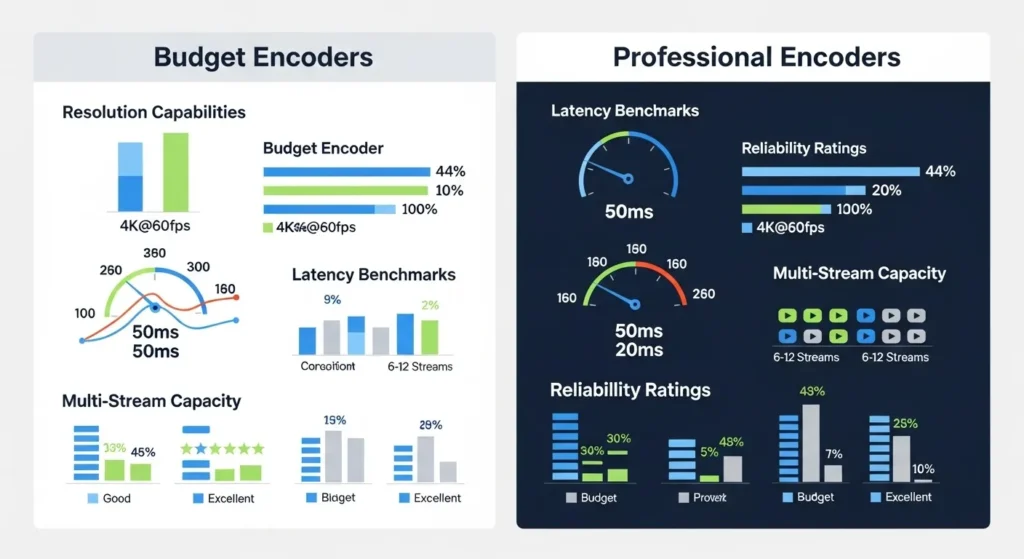
Multi-Stream Capability demonstrates the true power of professional encoding hardware. Premium units can simultaneously deliver streams to YouTube, Facebook, multiple IPTV servers, and backup destinations without performance degradation. This parallel processing capability would overwhelm budget encoders or require multiple units.
| Performance Metric | Budget Encoder (<$1500) | Professional Encoder (>$1500) |
|---|---|---|
| Max Resolution | 1080p @ 30fps | 4K @ 60fps |
| Max Bitrate | 10 Mbps | 100+ Mbps |
| Encoding Latency | 3-5 seconds | 50-100 ms |
| Simultaneous Streams | 1-2 | 6-12+ |
| Continuous Operation | 8-12 hours | 24/7 (years) |
| MTBF (Mean Time Between Failures) | 6-12 months | 3-5 years |
Thermal Performance testing reveals dramatic differences in sustained operation capability. Professional encoders maintain consistent performance across temperature ranges from 0°C to 50°C, while budget units often throttle performance or shut down when ambient temperatures exceed 35°C.
5 Powerful Reasons to Choose an IPTV Encoder Over 1500
Reason 1: Industrial-Grade Reliability Professional IPTV encoders over 1500 are built to broadcast industry standards with Mean Time Between Failures (MTBF) ratings exceeding 50,000 hours. Components undergo rigorous testing including temperature cycling, vibration resistance, and extended burn-in periods. This industrial-grade construction ensures consistent operation even in challenging environments like server rooms, broadcast facilities, or remote installations where maintenance access is limited.
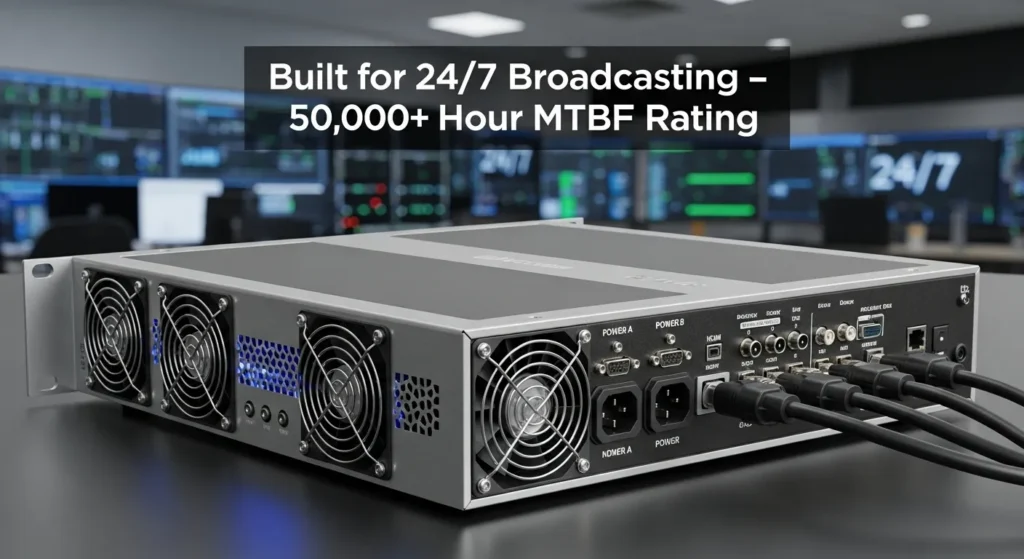
Reason 2: Superior Format and Protocol Support Premium encoders provide comprehensive codec support including H.264 (AVC), H.265 (HEVC), and emerging standards like AV1. This versatility enables optimization for different distribution scenarios—H.264 for maximum compatibility, H.265 for bandwidth efficiency, and AV1 for future-proofing. Protocol support encompasses RTMP, RTMPS, HLS, DASH, UDP, RTP, and SRT, ensuring compatibility with any IPTV infrastructure or content delivery network. IPTV encoder over 1500.
Reason 3: Optimized for 24/7 Broadcasting Continuous operation capability sets professional encoders apart from consumer alternatives. Advanced power management, redundant cooling systems, and component derating ensure stable performance during extended operation periods. Many units feature hot-swappable components and redundant power supplies, enabling maintenance without service interruption—critical for IPTV operations where downtime directly impacts revenue. IPTV encoder over 1500.
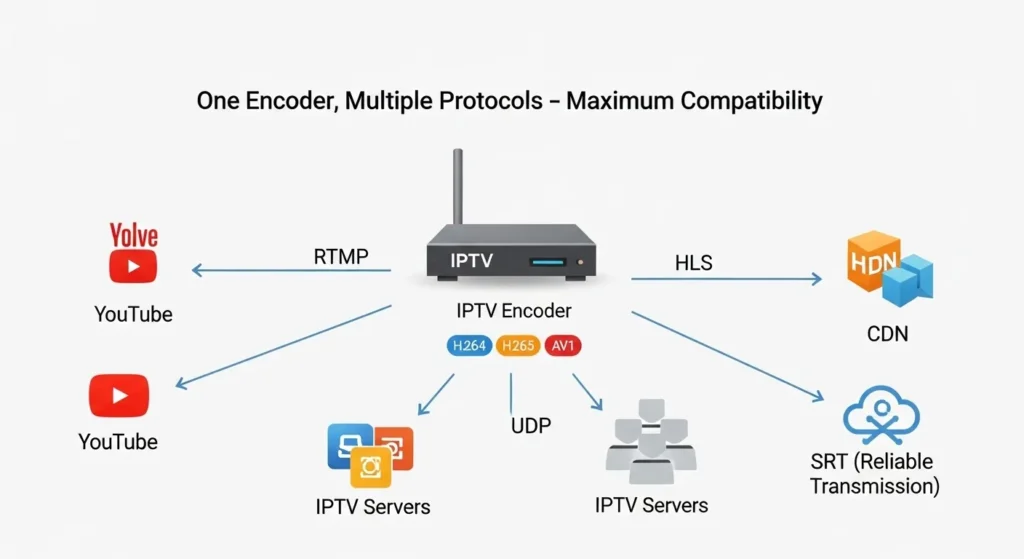
Reason 4: Better Thermal Management and Durability Professional thermal design prevents the performance degradation common in budget encoders during extended use. Multiple temperature sensors monitor critical components, while variable-speed fans adjust cooling based on operational load. This attention to thermal management extends component lifespan, maintains consistent encoding quality, and prevents the thermal-induced failures that plague consumer equipment in demanding applications. IPTV encoder over 1500.
Reason 5: Future-Proof Investment with ROI Premium encoders incorporate upgrade pathways including firmware updates for new codecs, protocol enhancements, and feature additions. This extensibility protects your investment as streaming standards evolve. The superior build quality and component selection result in longer operational lifespans—typically 5-7 years compared to 1-2 years for budget alternatives. When factoring reduced maintenance costs, improved reliability, and extended lifespan, professional encoders deliver superior total cost of ownership.
Common Mistakes to Avoid
Overpaying for Unnecessary Features While professional features add value, avoid specifications that exceed your operational requirements. A broadcaster streaming single 1080p channels doesn’t need 4K encoding capability, and paying for unused features reduces ROI. Focus on current requirements while ensuring reasonable future expandability.
Ignoring Cooling and Environmental Requirements Many IPTV professionals underestimate environmental considerations during encoder selection. Professional units require adequate ventilation, stable power, and controlled temperatures for optimal performance. Plan installation environments carefully, considering rack space, airflow patterns, and ambient temperature control. IPTV encoder over 1500.
Choosing Encoders Without Redundancy Single points of failure can devastate IPTV operations. Consider encoders with redundant power supplies, multiple network interfaces, and failover capabilities. For critical applications, implement encoder redundancy at the system level with automatic switching capabilities.
Not Checking Protocol Compatibility Ensure your chosen encoder supports the specific protocols required by your IPTV infrastructure. While most professional units offer comprehensive protocol support, verify compatibility with your specific middleware, CDN requirements, and distribution platforms before purchasing.
Best IPTV Encoder Over 1500 Models in 2025
Entry-Level Professional ($1,500–$3,000) This category serves small studios, growing IPTV resellers, and professional streamers transitioning from consumer equipment. Units typically support 1080p60 encoding, dual HDMI inputs, and comprehensive protocol support. Key features include hardware-based H.264/H.265 encoding, web-based configuration, and basic redundancy features. These encoders provide excellent value for operations requiring professional reliability without enterprise-scale features.
Mid-Tier Professional ($3,000–$6,000) Designed for established broadcasters and medium-scale IPTV operations, this category offers 4K encoding capability, multiple input interfaces (HDMI, SDI, IP), and advanced streaming features. Enhanced processing power supports multiple simultaneous streams, while improved cooling systems ensure reliable 24/7 operation. Features often include closed captioning support, advanced audio processing, and comprehensive monitoring capabilities.
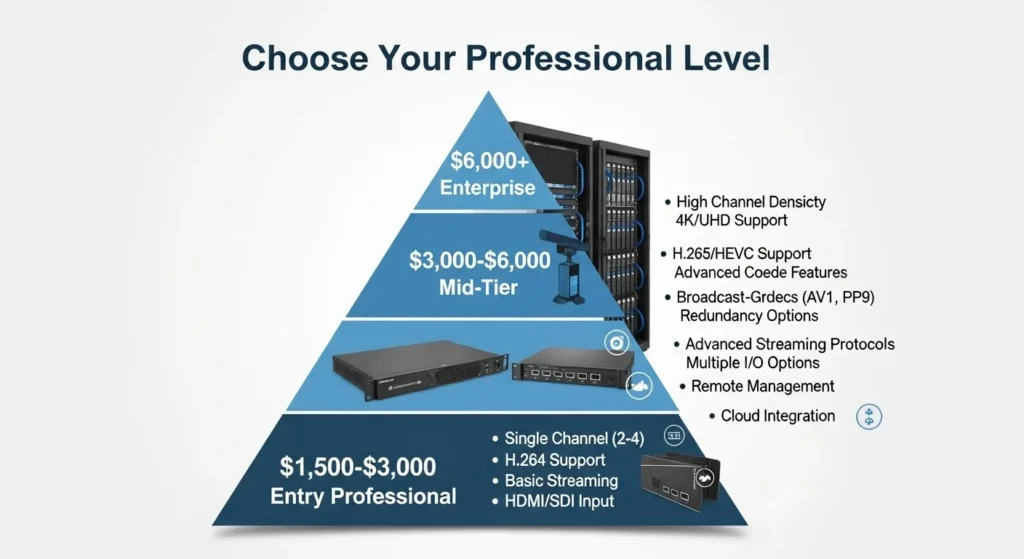
Enterprise-Scale ($6,000+) Purpose-built for ISP-scale streaming, major broadcasters, and critical infrastructure applications. These units provide maximum processing power, comprehensive redundancy, and advanced management features. Capabilities include multiple 4K stream generation, broadcast-grade SDI interfaces, and integration with professional broadcast infrastructure. Enterprise encoders often feature hot-swappable components, SNMP monitoring, and API integration for automated management systems. IPTV encoder over 1500.
Deployment Use Cases
IPTV Resellers Running 24/7 Channels Resellers operating continuous content channels require absolute reliability and consistent quality. Professional encoders enable automated scheduling, seamless source switching, and redundant streaming to multiple distribution points. The ability to maintain quality during extended operation periods directly impacts subscriber satisfaction and retention rates. IPTV encoder over 1500.
Professional Sports Streaming Live sports demand low-latency encoding with consistent quality during high-motion content. Professional encoders provide motion-optimized encoding profiles, sub-second latency capabilities, and the reliability required for time-sensitive broadcasts. Multi-stream capability enables simultaneous distribution to different platforms and quality tiers.
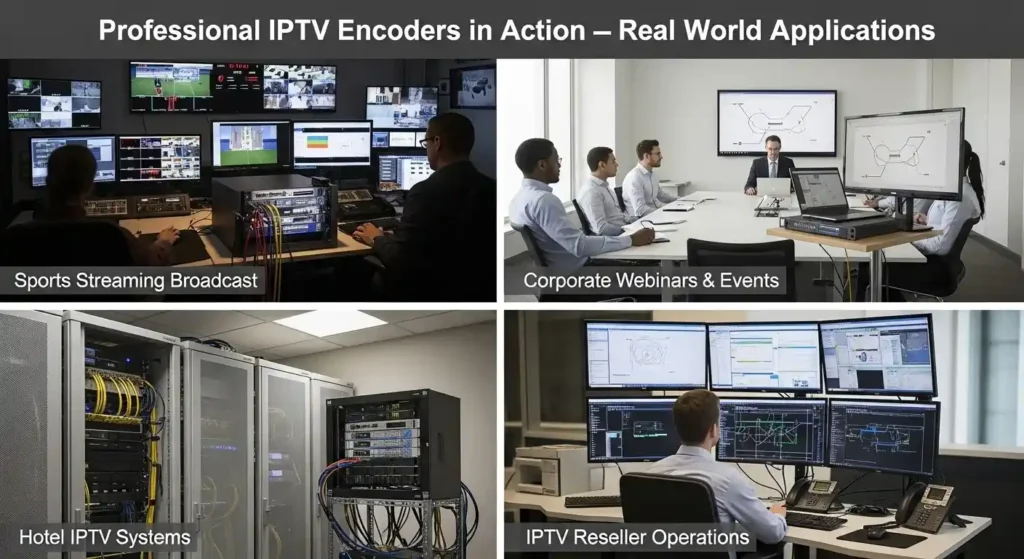
Corporate Training and Webinars Enterprise training applications require integration with existing IT infrastructure, security compliance, and reliable performance during critical presentations. Professional encoders offer enterprise authentication, encrypted streaming protocols, and the consistent performance necessary for professional corporate communications.
Hotel and Large Venue IPTV Systems Hospitality IPTV systems require high reliability, easy management, and cost-effective operation across hundreds of endpoints. Professional encoders provide centralized management capabilities, efficient compression for bandwidth optimization, and the reliability necessary for guest satisfaction. IPTV encoder over 1500.
Maintenance & Long-Term Reliability
Cooling and Airflow Management Regular cleaning of air filters and fans prevents thermal-related performance issues. Professional encoders typically include filter access panels and monitoring systems that alert administrators to maintenance requirements. Establish monthly cleaning schedules and monitor temperature logs to identify potential issues before they impact performance. IPTV encoder over 1500.
Firmware Updates and Codec Support Professional encoders receive regular firmware updates that add new codec support, improve performance, and address security vulnerabilities. Establish update procedures that include testing in non-production environments before deploying to live systems. Many professional units support remote update management for distributed installations.
Backup and Redundancy Planning Implement comprehensive backup strategies including configuration backup, spare unit availability, and automated failover systems. Professional encoders often include configuration export/import capabilities that simplify replacement procedures. Document all custom configurations and maintain current backups in multiple locations.
Performance Monitoring and Optimization Utilize built-in monitoring tools to track performance metrics, identify trends, and optimize settings over time. Professional encoders provide detailed statistics including encoding efficiency, thermal performance, and network utilization. Regular performance analysis helps identify optimization opportunities and predict maintenance requirements. IPTV encoder over 1500.
Conclusion
Choosing an IPTV encoder over 1500 represents a strategic investment in your streaming infrastructure’s future reliability and capability. The superior build quality, advanced features, and professional-grade performance of premium encoders deliver measurable advantages in operational efficiency, content quality, and long-term cost effectiveness.
The streaming industry’s continued growth and evolving technical requirements make professional encoding equipment essential for serious IPTV operations. Whether you’re scaling an existing service, launching new channels, or upgrading aging infrastructure, professional encoders provide the foundation for sustainable, high-quality streaming services. IPTV encoder over 1500.
The initial investment in professional equipment quickly pays dividends through reduced maintenance costs, improved reliability, and enhanced capability to serve demanding audiences. In an industry where quality and reliability directly impact subscriber satisfaction and revenue, professional encoding equipment isn’t just an option—it’s a business necessity.
Ready to upgrade your workflow? Invest in an IPTV encoder over 1500 today and future-proof your streaming infrastructure for the demanding requirements of tomorrow’s broadcasting landscape.
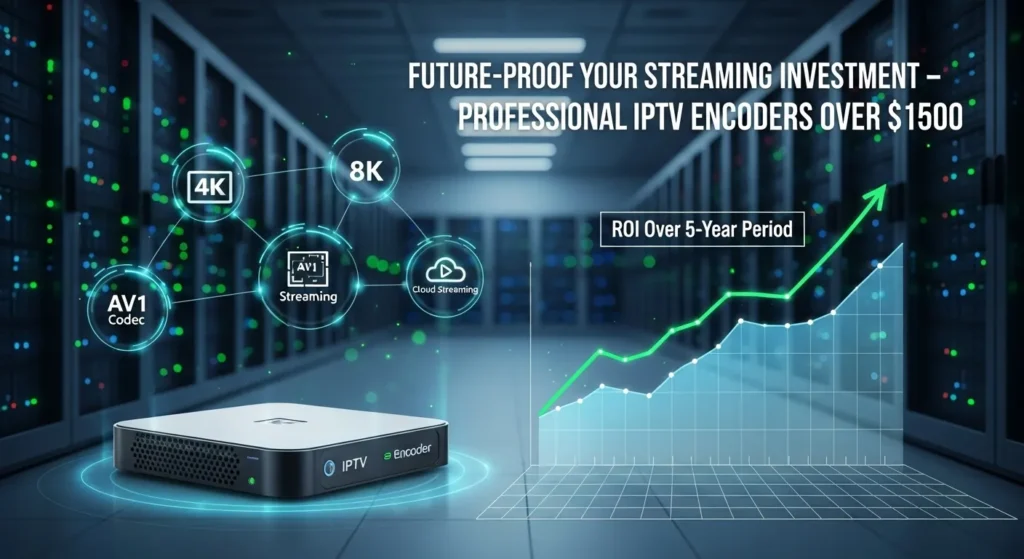
FAQs
Q1: Is an IPTV encoder over 1500 worth it for beginners? For serious beginners planning professional operations, yes. While the initial investment is higher, professional encoders eliminate many learning curve frustrations through superior reliability and performance. However, hobbyists or those testing IPTV concepts might start with budget options before upgrading to professional equipment.
Q2: Do these encoders support multi-platform streaming? Yes, professional IPTV encoders over 1500 typically support simultaneous streaming to multiple platforms including YouTube, Facebook, Twitch, and custom RTMP destinations. This multi-streaming capability maximizes content reach while maintaining centralized control and consistent quality.
Q3: Can they handle 4K and future formats? Modern professional encoders support 4K encoding at 60fps with advanced codec options including H.265 and emerging AV1 support. Many units receive firmware updates that add support for new formats and standards, protecting your investment as technology evolves. IPTV encoder over 1500.
Q4: What’s the difference between an encoder and a transcoder? Encoders convert raw video signals into compressed streaming formats, while transcoders convert between different compressed formats. Professional IPTV encoders often include transcoding capabilities, enabling format conversion and multi-bitrate output generation from single inputs.
Q5: How long do IPTV encoders over 1500 last in 24/7 use? Professional encoders are designed for continuous operation with typical lifespans of 5-7 years under 24/7 use. Component derating, advanced cooling systems, and industrial-grade construction enable extended operational periods that would overwhelm consumer equipment. Regular maintenance can extend operational life even further. IPTV encoder over 1500.

